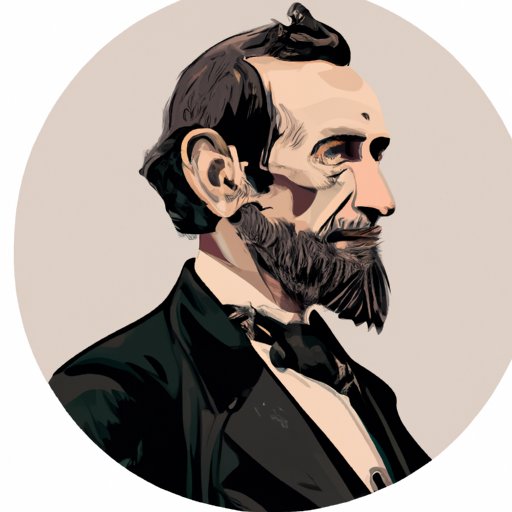Introduction
Abraham Lincoln is widely regarded as one of America’s greatest presidents and a model of effective leadership. He was an inspirational leader who had the courage and resilience to make difficult decisions in times of crisis. His legacy of equality and social justice remain relevant today and serve as an example for all leaders. In this article, we will explore why Abraham Lincoln is considered a good leader by examining his political and military experience, his ability to inspire others, his courage and resilience in adversity, his commitment to unifying the country and preserving democracy, and his skillful use of language.
Examining Lincoln’s Leadership Qualities
Before becoming president, Abraham Lincoln had a long career in politics and the military. He served in the Illinois state legislature from 1834 to 1841 and in the U.S. House of Representatives from 1847 to 1849. He was also a captain in the Illinois militia during the Black Hawk War. This extensive political and military experience gave him the knowledge and skills he needed to lead the country during the Civil War.
Lincoln was also known for his ability to inspire and motivate others. He was an excellent public speaker and could rally people behind his cause. He was able to articulate his vision for the future and create a shared sense of purpose among those he led. His powerful words are still remembered today, such as “we shall nobly save, or meanly lose, the last best hope of earth.”
Lincoln was also known for his courage and resilience in the face of adversity. He faced many challenges as president, including the secession of the Southern states, the outbreak of the Civil War, and opposition from within his own party. Despite these obstacles, he persevered and took decisive action when necessary. He showed remarkable fortitude and steadfastness in the face of danger and uncertainty.
Exploring the Impact of Lincoln’s Decisions
During his presidency, Lincoln made several major decisions that had a lasting impact on the United States. The most notable of these was the Emancipation Proclamation, which declared that all slaves in the Confederate states were free. This was a bold move that changed the course of American history and helped pave the way for the end of slavery. He also delivered the famous Gettysburg Address, which emphasized the importance of democracy and freedom, and signed the Thirteenth Amendment, which officially abolished slavery in the United States.
Analyzing Lincoln’s Legacy of Equality
Lincoln was a firm believer in equality for all people, regardless of race or gender. He was committed to the idea of social justice and worked to ensure that everyone had access to the same rights and opportunities. He believed strongly in the power of education and sought to make it available to all Americans, regardless of their background. He also worked to promote civil rights and racial equality, and fought to end discrimination in all its forms.
Comparing Lincoln to Other Notable Leaders
Lincoln can be compared to other great leaders in American history, such as George Washington, Martin Luther King Jr., and John F. Kennedy. All four of these men were courageous and determined in their pursuit of justice and equality. They were also inspiring speakers and had a strong vision for their country’s future. Each of them left a lasting legacy of reform and progress.
Understanding Lincoln’s Vision for America
One of Lincoln’s primary goals as president was to preserve and strengthen the Union. He was committed to reunifying the nation after the Civil War and restoring the bonds between the North and South. He also sought to protect and uphold the principles of democracy and freedom. He was passionate about ensuring that all citizens would have the same rights and opportunities, regardless of their race or gender.
Examining Lincoln’s Communication Style
Lincoln was an effective communicator who used language skillfully to convey his ideas. He was known for his use of logic and reason, as well as his appeal to emotions. He was a master of rhetoric and could move audiences with his words. He was able to speak to people on their level and inspire them to take action.
Conclusion
Abraham Lincoln was an exceptional leader who demonstrated courage, resilience, and compassion in his pursuit of equality and justice. He was a skilled political and military leader who understood the importance of unifying the nation and preserving democracy. His communication style was both logical and emotional, and he was able to inspire and motivate those around him. Today, he stands as a model of effective leadership and a reminder of the power of perseverance in the face of adversity.
(Note: Is this article not meeting your expectations? Do you have knowledge or insights to share? Unlock new opportunities and expand your reach by joining our authors team. Click Registration to join us and share your expertise with our readers.)
